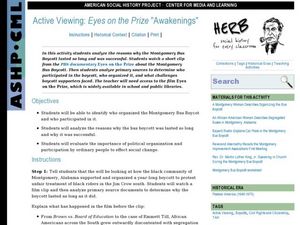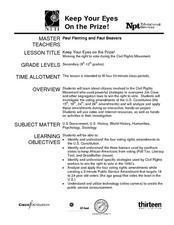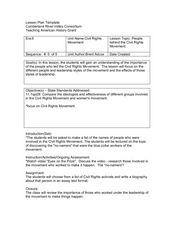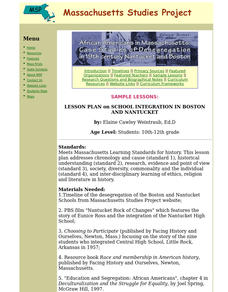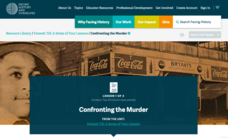Curated OER
Active Viewing: Eyes on the Prize "Awakenings"
Dive deeper into the Montgomery Bus Boycott with this multi-stage lesson, centered on the essential question: Why did the boycott last so long? Historians investigate the Jim Crow south through a video clip (not included), then analyze...
Curated OER
Keep Your Eye On the Prize
High schoolers learn about citizens who were actively involved in the civil rights movement, and the strategies they used to overcome the Jim Crow laws that were so prevalent in the 1960s. They investigate the voting amendments of the US...
Facing History and Ourselves
Eyes on the Prize Lesson 1: The Philosophy of Nonviolence
High schoolers explore the concept of nonviolent demonstration. In this Civil Rights Movement activity, students investigate examples of injustice and discuss the philosophy of nonviolence fueled by leaders of the movement. High...
Curated OER
Eye on the Prize challenge
In this spinner math worksheet, students draw arrows on spinners to show numbers needed to add totals and solve number combinations to total ten. Students solve four problems.
Facing History and Ourselves
Eyes on the Prize Lesson 2: Six Steps for Nonviolent Social Change
Students explore the concept of nonviolent protest. For this Civil Rights lesson, students examine the attributes of nonviolent protest as they investigate the student protests that took place in Nashville in 1960-1961. Students reflect...
Curated OER
Desegregation and the Courts
Students investigate Judge Garrity's ruling in the Boston bussing dilemma. For this desegregation lesson, students view segments of "Eyes on the Prize" and examine the role that courts played in desegreration. Students also...
Curated OER
The Nobel Prize in Chemistry 2003 - Information for the Public
An information-packed eight-page article detailing the history of understanding active transport across cell membranes makes up the bulk of this handout. Two pages of reading comprehension and critical-thinking questions follow. The...
Spark People
SMART Goal-Setting Worksheet
Help keep young scholars' eyes on the prize with this step-by-step goal setting instructional activity.
Stanford University
Beyond Vietnam
On April 4, 1967 Martin Luther King, Jr. delivered his speech "Beyond Vietnam." The controversy that followed is the focus of a three-instructional activity unit that asks class members to consider the political and social implications...
Curated OER
Eyes Worldwide on the Prize
Students examine Martin Luther King, Jr.'s "I Have a Dream" speech and see how it has been produced in China by reading an online article. They study discrimination in the world and write responses to the speech.
Curated OER
People behind the Civil Rights Movement
Students identify the people actively involved in the Civil Rights Movement. In this United States History lesson, students watch the video "Eyes on the Prize" then participate in a class discussion about the video. Students also...
US Institute of Peace
What Does It Take to Be a Peacebuilder?
Is the spirit of peacebuilding already inside you? Scholars take a closer look at the characteristics of peacebuilders, past and present, in lesson 13 of a 15-part series. Individuals identify common traits of peacebuilders, then work...
Curated OER
The March from Selma to Montgomery
Students examine voter discrimination. In this Civil Rights lesson, students watch segments of "Eyes on the Prize" and discuss the organization of the march from Selma to Montgomery. Students conduct interviews to learn...
Curated OER
Eyes on the Prize: The Philosophy of Nonviolence
Learners examine the goals and rationale of nonviolence. As a class, they identify the concept of the Beloved Country and how they wanted to use nonviolence to achieve it. They discuss how the philosophy of nonviolence can relate to...
Curated OER
A Look Through My Antonia's Eyes
Thoroughly delve into My Antonia by Willa Cather with a plethora of activities. Engage scholars with videos and web sites in this week-long unit that explains the historical context and creates pioneers in the field of research. An...
Curated OER
Lesson Plan on School Integration in Boston And Nantucket
Students use primary sources and timelines to begin a study of school integration; students watch "Nantucket Rock of Changes," and compare the case of Eunice Ross with the story of the Little Rock Nine.
Facing History and Ourselves
Emmett Till: Confronting the Murder
The 1955 murder of Emmett Till is often regarded as the catalyst for the Civil Rights Movement of the 20th century. Learn more about the brutal crime—and, as many believe, the miscarriage of justice—that began a national conversation...
Curated OER
Earth Book
After viewing a teacher-led demonstration on a variety of landforms of the Earth, 1st graders create an Earth book. This nicely-done hands-on lesson has students produce books that describe, in pictures and words, different aspects of...
Curated OER
Global Eyes
Twelfth graders consider global issues and their effects. They identify the themes of human needs, human rights, and the environment, select a topic and research articles for a Global Current Events Portfolio. Working in small groups,...
Curated OER
Graphic Accounts
Young scholars identify the use of different types of bar graphs. They analyze graphs used in the New York Times to compare the estimated cost of the war in Iraq to other hypothetical expenditures and reflect on how graphs can help...
Curated OER
In the Eyes of the Beholder
Students investigate the relationship between the consumers and producers with the role that the government plays in the free enterprise system.
K12 Reader
Elegy for Lincoln: Walt Whitman’s Poem
Walt Whitman's "O Captain! My Captain!" is one of the most famous and emotional tributes to Abraham Lincoln. Guide readers through the evocative elegy with a reading comprehension worksheet, complete with the poem's text and a...
E Reading Worksheets
Making Predictions #1
How can you tell what is going to happen next in a story? Learn to make predictions with five sections of stories. Kids read the beginning, and then write what they believe will happen next. Additionally, they provide evidence for their...
Curated OER
Feudalism
Students have tournaments in teams after learning information about The Middle Ages. In this Middle Ages lesson plan, students learn that tournaments are mock battles, but that they will have these battles by answering questions in teams...


